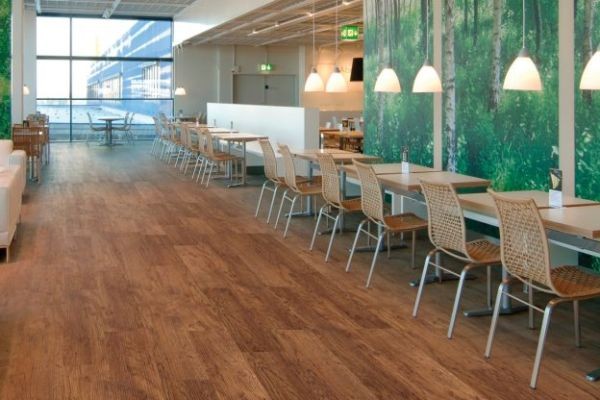The hospitality flooring market is undergoing a transformative shift in 2025, fueled by increasing investment in digitally printed, customized, and luxury flooring solutions. As the global hospitality sector becomes more design-driven and experience-focused, flooring has moved beyond its traditional utilitarian role to become a central element of branding, ambiance, and guest engagement.
Hotels, resorts, and event venues are recognizing the value of high-impact flooring—both visually and functionally. Flooring is now a storytelling surface, a comfort feature, and a key part of the overall design language. This evolution is reshaping the market as operators invest in premium materials and innovative technologies that reflect their unique brand identities.
Digitally Printed Flooring Sets a New Design Standard
Digital printing has revolutionized the flooring industry, especially in hospitality. Advanced printing technologies allow for photorealistic visuals, intricate patterns, and customized designs that were previously impossible or prohibitively expensive.
1. Endless Design Possibilities
Digitally printed flooring enables hotels to recreate the look of exotic hardwoods, natural stone, artisanal tile, or even abstract art—without the maintenance and cost typically associated with those materials. This technology empowers designers to tailor flooring to specific themes, cultural motifs, or seasonal aesthetics.
For boutique hotels, in particular, custom digital prints offer a cost-effective way to differentiate rooms, public spaces, and event areas while keeping the flooring durable and easy to maintain.
2. Brand Identity Through Flooring
Custom-printed flooring is also being used as a subtle yet powerful branding tool. Logos, thematic graphics, and signature color schemes can be embedded directly into the floor design, reinforcing brand identity throughout the guest experience—from reception to restrooms.
This level of customization is especially impactful in concept hotels, art-focused accommodations, and destination resorts looking to offer a fully immersive stay.
The Rise of Custom Flooring in Boutique and Lifestyle Hotels
Customization is no longer reserved for elite design projects—it's now a mainstream expectation in hospitality. Hotels are looking to craft memorable, Instagram-worthy spaces, and custom flooring provides a unique opportunity to anchor those visual moments.
1. Personalized Guest Experiences
Custom flooring enables designers to create differentiated zones with distinct personalities. A vibrant patterned tile might define the café area, while soft, natural textures distinguish wellness spaces or guest suites. These subtle shifts in design help guide movement, influence mood, and elevate the overall guest journey.
2. Cultural and Regional Relevance
Hotels embracing local culture often use customized flooring to reflect regional identity. Whether it’s Moroccan tiles, Japanese-inspired tatami patterns, or Indian mandala motifs, flooring becomes a canvas for storytelling that resonates with guests seeking authenticity.
This approach also appeals to eco-conscious travelers, as many custom flooring materials can be sourced sustainably and manufactured locally to reduce carbon footprints.
Luxury Flooring Defines High-End Hospitality Standards
In the premium segment of the hospitality market, flooring is considered a luxury detail that must align with the brand’s overall exclusivity. From five-star city hotels to tropical private resorts, luxury flooring materials are being chosen not just for looks, but also for tactile and emotional appeal.
1. Sophistication Meets Function
Luxury flooring materials—such as engineered hardwood, large-format porcelain tiles, high-end natural stone, and woven wool carpets—are being integrated into design schemes that emphasize elegance, warmth, and distinction. These surfaces not only elevate interiors visually, but also enhance acoustic comfort and underfoot feel.
Durability is still essential in luxury environments, so many brands are turning to hybrid solutions that combine aesthetic finesse with commercial-grade performance.
2. Enhanced Guest Perception
In luxury hospitality, every design detail contributes to perceived value. High-end flooring helps establish an immediate sense of quality and comfort, encouraging repeat visits and positive reviews. Whether it’s a marble-finish lobby or plush carpeting in a penthouse suite, flooring supports the sensory experience that defines a premium stay.
Market Outlook: Demand for High-Impact Flooring on the Rise
The hospitality flooring market is forecasted to grow steadily as hoteliers continue to renovate, reposition, and launch new properties. Digitally printed, customized, and luxury flooring options are at the forefront of this expansion for several reasons:
-
Shorter installation times and modular options enable faster renovation cycles.
-
Advanced materials offer better wear resistance, slip protection, and low-VOC emissions.
-
Design flexibility enhances branding and guest personalization.
-
Luxury finishes align with guest expectations in upscale and boutique segments.
As technology continues to advance and the emphasis on design intensifies, these flooring trends are expected to dominate hospitality interiors well into the future.
Conclusion
In 2025, the hospitality flooring market is experiencing strong momentum, fueled by demand for digitally printed, custom-designed, and luxury flooring options. Hoteliers are recognizing that floors are no longer just surfaces to walk on—they’re essential design elements that influence emotion, behavior, and brand perception.
Whether through advanced printing, bespoke aesthetics, or premium finishes, flooring is helping hotels create spaces that are not only functional and durable but also immersive and unforgettable. The investment in high-impact flooring is no longer optional—it's becoming a competitive necessity in the evolving hospitality landscape.

